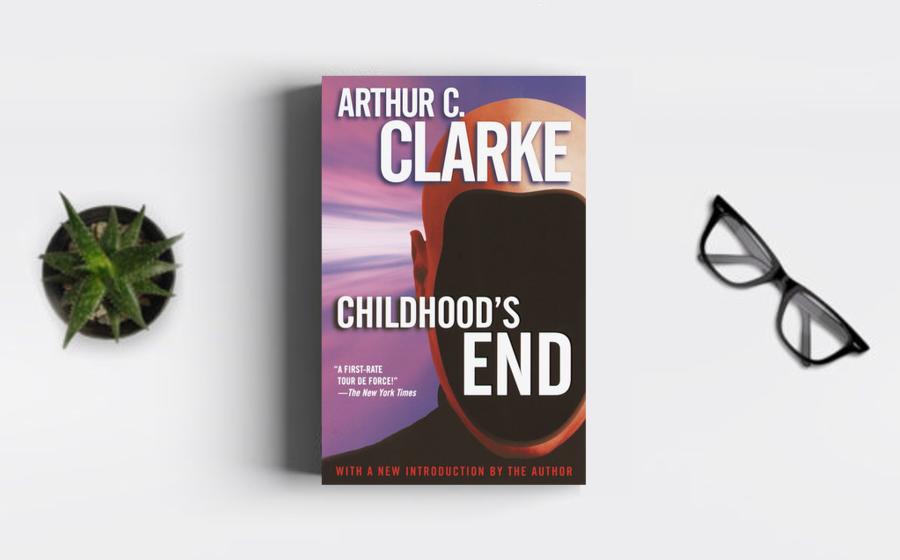"Childhood's End," published in 1953, is a
groundbreaking work of science fiction that has left an
indelible mark on the genre. As one of the seminal works
by one of the "Big Three" science fiction writers
alongside Isaac Asimov and Robert A. Heinlein, Clarke's
novel is celebrated for its visionary ideas, profound
philosophical exploration, and its influence on
subsequent generations of science fiction creators.
"Childhood's End" not only captures the imagination with
its compelling narrative but also introduces
transformative concepts that challenge conventional
understandings of humanity, evolution, and the potential
future of the species.
The novel begins with the
arrival of mysterious and benevolent extraterrestrial
beings known as the Overlords, who come to Earth to
guide humanity toward a new era. Led by their enigmatic
supervisor, Karellen, the Overlords eliminate war,
disease, and poverty, ushering in an age of peace and
prosperity. However, the Overlords keep their appearance
hidden, leading to widespread speculation and
apprehension among the human population.
One of
the groundbreaking elements of "Childhood's End" is its
exploration of the next stage in human evolution. Clarke
introduces the concept of transcendence, a
transformation of the human species into a higher state
of being. The novel challenges traditional notions of
human destiny and evolution, presenting a vision of a
future where humanity undergoes a radical metamorphosis
guided by the Overlords. This theme of transcendence and
the evolution of consciousness places "Childhood's End"
on the cutting edge of speculative fiction, inspiring
later works that explore the potential for
transformative changes in the human condition.
Clarke's narrative structure is another groundbreaking
aspect of the novel. "Childhood's End" is divided into
three distinct parts, each capturing a different stage
in the evolution of both humanity and the Earth. This
unconventional approach allows Clarke to explore the
long-term consequences of the Overlords' intervention
and the profound impact it has on the fabric of human
society. The narrative structure contributes to the
novel's status as a visionary work, as it offers readers
a panoramic view of the transformation unfolding over
centuries.
The enigmatic nature of the Overlords
and their influence on Earth's development add a layer
of mystery and suspense to the novel. Clarke masterfully
builds tension as the true intentions of the
extraterrestrial visitors remain shrouded in ambiguity.
This element of the unknown, coupled with the gradual
revelation of the Overlords' role in shaping humanity's
destiny, creates a sense of anticipation and wonder that
keeps readers engaged.
"Childhood's End" is
groundbreaking in its thematic exploration of utopia and
the potential pitfalls of an idealized society. The
Overlords' intervention brings about a utopian age on
Earth, but it comes at the cost of individual freedom
and creativity. Clarke challenges the notion that utopia
is an unattainable ideal, presenting a scenario where
the pursuit of a perfect society leads to unforeseen
consequences. This thematic depth distinguishes the
novel from simplistic portrayals of utopia in science
fiction and contributes to its enduring relevance in
discussions about the trade-offs inherent in the pursuit
of a better world.
The novel's influence on the
science fiction genre is evident in its impact on
subsequent works and the themes it introduced to the
genre. The concept of benevolent extraterrestrial beings
guiding humanity's evolution has become a recurring
motif in science fiction, and "Childhood's End" remains
a touchstone for explorations of transcendence and the
potential for radical transformations in human
existence. The novel's legacy is seen in the way it
paved the way for more philosophical and speculative
examinations of the future of humanity.
The
character of Karellen, the supervisor of the Overlords,
is a central figure in the novel's exploration of power
dynamics and the responsibilities of advanced
civilizations. Karellen's benevolent dictatorship raises
questions about the role of authority and the ethical
dilemmas inherent in guiding the development of a less
advanced species. The novel prompts readers to reflect
on the consequences of unchecked power and the moral
quandaries faced by those who hold the fate of an entire
civilization in their hands.
The conclusion of
"Childhood's End" is a profound and thought-provoking
culmination of the novel's themes. As humanity
approaches the final stage of its evolution, Clarke
introduces a transcendent and mystical element that
challenges traditional understandings of reality and
consciousness. The novel's conclusion is open to
interpretation, inviting readers to contemplate the
mysteries of existence and the potential for higher
forms of consciousness beyond the limitations of human
understanding.
Clarke's prose is characterized by
its clarity, precision, and ability to convey complex
scientific and philosophical concepts in an accessible
manner. His writing style contributes to the novel's
accessibility while maintaining a sense of intellectual
rigor. This balance allows "Childhood's End" to appeal
to a wide audience, from seasoned science fiction
enthusiasts to those new to the genre.
"Childhood's End" stands as a groundbreaking work of science fiction that pushes the boundaries of the genre and explores profound themes of evolution, transcendence, and the consequences of utopia. Arthur C. Clarke's visionary ideas, narrative structure, and thematic depth have solidified the novel's place in the canon of science fiction literature. "Childhood's End" remains a thought-provoking and influential work that continues to inspire readers and creators alike, serving as a testament to the enduring power of speculative fiction to challenge, inspire, and expand the boundaries of the human imagination.






